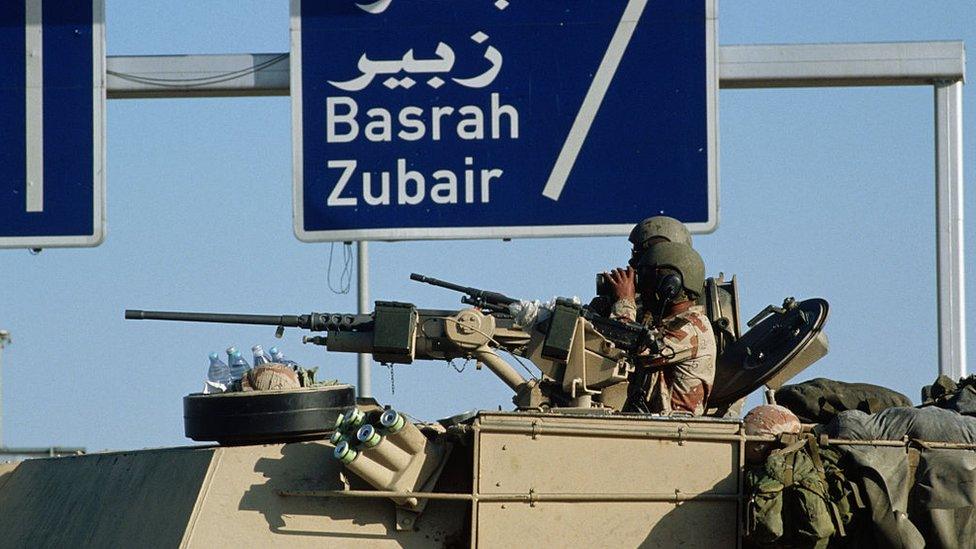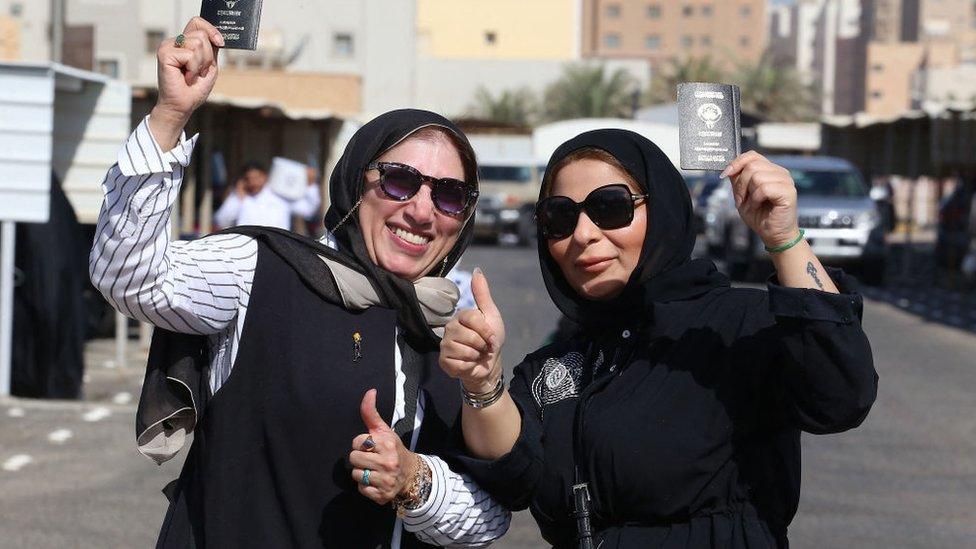Kuwait profile - Timeline
- Published

The Grand Mosque in Kuwait City is one of the largest in the Gulf
A chronology of key events:
1600s - North-east portion of Arabian peninsula becomes part of the Ottoman Empire.
1700s - Settlers arrive at the site of present-day Kuwait City from the interior of the Arabian peninsula. The settlement grows into a bustling trading hub by the early 1800s.
1756 - Kuwait comes under the control of the Al-Sabah family, predecessors of Kuwait's present rulers. A degree of semi-autonomy from Ottoman Turkey prevails.
1899 - Fearing direct rule from Turkey, Sheikh Mubarak "the Great" strikes a deal with Britain and Kuwait becomes a protectorate. Britain provides naval protection in return for Kuwait allowing London to control its foreign affairs.
1937 - Large oil reserves discovered by the US-British Kuwait Oil Company. Exploitation is delayed by World War II, but thereafter fuels the country's development into a modern commercial centre.
1951 - Major public-works programme begins; Kuwait's infrastructure is transformed, residents enjoy a high standard of living.
Independence
1961 June - Kuwait becomes independent with the end of the British protectorate; the sheikh becomes an emir. The country joins the Arab League. Iraq renews claims that Kuwait is part of its territory but backs down after British military intervention.
1963 - Elections held for National Assembly, under terms of newly-drafted constitution.
1976 - Emir suspends National Assembly, saying it is not acting in the country's interests.
1980 - Iran-Iraq war: Kuwait supports Iraq strategically and financially.
1981 - National Assembly recalled; dissolved again in 1986.
1985-86 - Domestic security concerns, particularly about Iran's perceived influence over the Shi'ite minority, prompt the deportations of thousands of expatriates, many of them Iranian.
1990 July - Iraq complains to Opec, accusing Kuwait of stealing its oil from a field near the border. Iraqi President Saddam Hussein threatens military action.
Iraqi invasion
1990 August - Iraq invades and then annexes Kuwait. The emir and cabinet flee to Saudi Arabia.
1991 January - Iraq fails to comply with a UN resolution ordering it to pull out. A US-led and UN-backed bombing aerial campaign begins in Kuwait and Iraq. By late February allied forces reach Kuwait City. Iraqi forces torch oil wells as they pull out.

US soldiers in Kuwait at the end of the First Gulf War
1991 March - Emir returns, imposes three-month period of martial law.
1992 - Under domestic and international pressure, Emir gives green light to National Assembly elections. Opposition forces perform well in the vote.
1993 - UN demarcates new Kuwait-Iraq border, awarding a port and a number of oil wells to Kuwait. US troops despatched to Kuwait following Iraqi border incursions.
1994 - Iraq officially recognises Kuwait's independence and the UN-demarcated borders following UN pressure and Russian mediation.
1999 - Emir suspends National Assembly after bitter feud between MPs and cabinet about misprints in state-published edition of the Koran. Government supporters suffer shock setback in resulting elections; liberals and Islamists predominate in the new assembly.
2001 March - Kuwaiti court commutes to life imprisonment a death sentence handed down in 2000 to the country's pro-Iraqi puppet ruler during the 1990-91 invasion.
Second Iraq War
2003 March - Tens of thousands of soldiers converge on the Kuwait-Iraq border for a US-led military campaign to disarm and oust Iraqi leader Saddam Hussein.
2003 July - Islamist and pro-government candidates fare well in parliamentary elections. There are major losses for liberal candidates.
Emir appoints Sheikh Sabah al-Ahmad al-Sabah prime minister, separating post from role of heir to throne for first time since independence.
2005 January - Deadly gun battles erupt between suspected Islamist militants and police.
2005 May - Parliament approves a law allowing women to vote and run for parliament. In June the first woman cabinet minister, Massouma al-Mubarak, is appointed.
2006 January - The emir, Sheikh Jaber, dies. The crown prince, Sheikh Saad, succeeds him but is removed days later because of concerns about his ailing health. Sheikh Sabah al-Ahmad is sworn in as emir.
2006 February - Sheikh Sabah names his brother, Sheikh Nawaf, as crown prince and his nephew Sheikh Nasser as prime minister.
2006 April - Women cast their votes for the first time, in a municipal by-election.
2006 June - Women fail to win any seats in their first attempt to compete in parliamentary elections. The opposition - a loose alliance of reformists, liberals and Islamists - makes gains, winning nearly two-thirds of the seats.
2006 December - Information Minister Mohammad al-Sanousi resigns. He was to face questioning in parliament over allegations that he curbed media freedoms in the run-up to parliamentary elections in June.
Assertive parliament
2007 March - The government resigns in a move aimed at thwarting a no-confidence motion against the health minister. The new cabinet includes two women.
2007 June - Oil Minister Sheikh Ali resigns amid a political standoff between the government and parliament.
2007 July - Kuwaitis are urged to conserve electricity as generators struggle to meet demands of economic growth fuelled by record oil exports.
2008 March - Emir dissolves opposition-dominated parliament and calls elections for 17 May after cabinet quits over alleged lack of cooperation from MPs.
2008 May - Radical Islamists make gains in parliamentary elections, winning more than half of the 50 seats. No women are elected. Emir re-appoints Sheikh Nasser al-Mohammad al-Ahmad as prime minister.
2009 January - Prime Minister Sheikh Nasser Mohammad al-Ahmad al-Sabah forms new government after parliamentary row over visit by a Shia cleric.
2009 February - Foreign Minister Sheikh Muhammad al-Sabah flies to Baghdad in highest-level visit since Iraq's armed forces invaded Kuwait in 1990.
2009 March - Emir dissolves parliament after it demands to question his nephew and PM, Sheikh Nasser Mohammad al-Ahmad al-Sabah, about corruption allegations.
2009 May - Three women MPs - Kuwait's first - win seats in parliamentary elections.
2009 October - Constitutional court rules women can obtain passports without the consent of their husbands.
In another ruling, it decides women MPs are not required to wear an Islamic head cover.
2009 December - Prime Minister survives an attempt by the opposition to remove him over corruption allegations.
2010 December - MPs injured as police clash with demonstrators protesting against alleged government plot to change constitution.
2011 March - Hundreds of young people demonstrate for reform, inspired by a wave of protests across the Arab world.
2011 December - Emir dissolves parliament and replaces his prime minister following protests and a showdown over allegations of high-level corruption.
2012 February - Islamist-led opposition wins majority in parliamentary elections.
2012 May - Emir blocks proposal by MPs to make all legislation comply with Islamic law.
2012 June - Constitutional Court ruling effectively dissolves Islamist-dominated parliament.
2012 September - Constitutional Court rejects government bill to redraw constituencies ahead of fresh elections. Opposition says the bill would have given official candidates an advantage.
2012 October - The Emir dissolves parliament, paving the way for snap elections. At least 5,000 protesters clash with security forces outside parliament over opposition fears that the government will try to redraw constituency boundaries.
2012 December - Elections boycotted by the opposition protesting against changes to electoral law.
2013 April - Opposition leader Mussallam al-Barrak is sentenced to five years in jail for insulting the emir.
2013 June - Constitutional court orders dissolution of parliament, effectively dismissing results of parliamentary polls.
2013 July - Parliamentary elections, with liberals and candidates from the smaller tribes making gains.
2014 June - Several TV channels banned from airing programmes about an alleged plot against the ruling system.
2015 March - Kuwait and four other Gulf states take part in Saudi-led air strikes on Houthi rebels in Yemen.
2015 June - Sunni extremist carries out suicide attack on Shia mosque, killing 27 worshippers and injuring more than 200. Seven people are sentenced to death in connection with the attack.
2020 September - Sheikh Nawaf takes over as emir on the death of his half-brother
2016 November - Opposition groups and their allies in Kuwait win nearly half the fifty seats in parliament.
2020 September - Sheikh Nawaf takes over as emir on the death of his half-brother Sheikh Sabah al-Ahmed al-Jaber al-Sabah.

Kuwaiti women display their passports as they vote during the September 2022 parliamentary elections